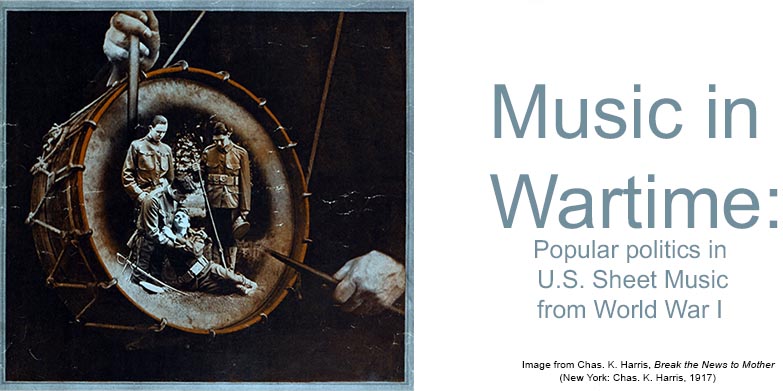America & Germany
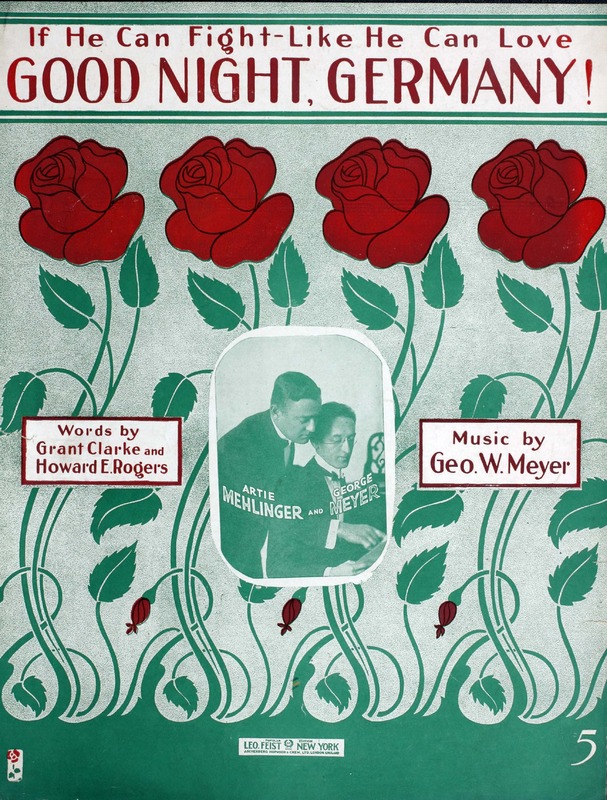
Title found in Gaylord Music Library Special Collections. Click the image for more details about this item; click here to download a pdf of the score.
The unprinted third verse of Oh, Frenchy (discussed in America & France) illustrates the anti-German attitude prevalent in American sheet music during World War I. Germany was the enemy, and the Allied forces (led, of course, by the American army) would trounce them and restore peace to Europe. Such American bravado was at its height in comic songs, praising the courage of American troops and mocking that of the German forces.
These sentiments found expression in songs like If He Can Fight Like He Can Love, Goodnight, Germany!, composed by George W. Meyer (1884-1959). Whereas comic songs about American allies in France often featured named characters, cute imitations of spoken French, and giddy admiration for the more superficial aspects of French culture, If He Can Fight, and other anti-German songs, offered the opposite. Germans were rarely introduced as individual characters with names and personalities. Instead, they were often referred to en masse, clumped together with Austrians and Hungarians with casual insults. The narrator of If He Can Fight announces, “Ev’ry Hun had better run and find a great big linden tree” to hide behind. The linden tree was a popular symbol for Germany, frequently appearing in German poetry. Listen to If He Can Fight at the University of California, Santa Barbara Library here.
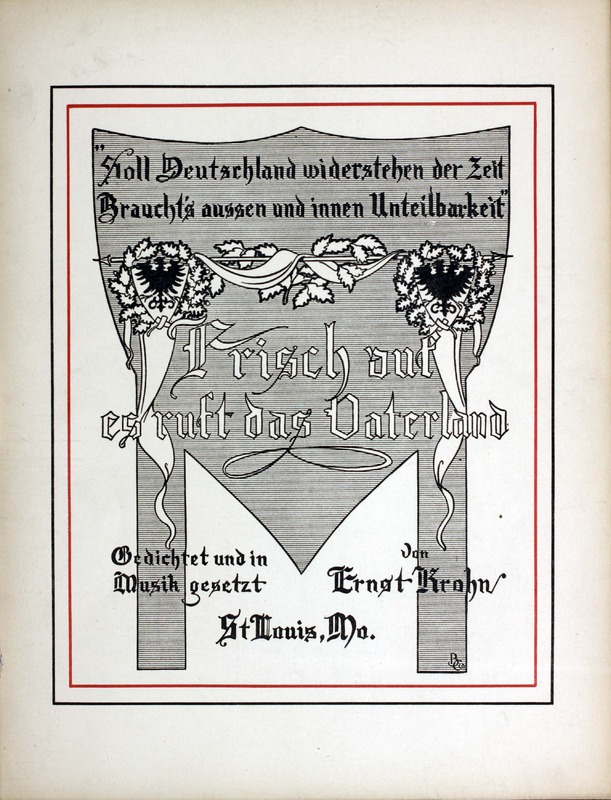
Title found in Gaylord Music Library Special Collections. Click the image for more details about this item; click here to download a pdf of the score.
Frisch auf es ruft das Vaterland (Let's Go! The Fatherland Is Calling, 1914-1915) by Ernst Krohn (1860-1930) symbolizes the difficulty German-Americans had in sorting out their cultural and political ties.
The lyrics for Frisch auf, written by the composer just as the war was beginning, reveal the lingering loyalties some German-Americans felt for the nation they still considered their homeland. The fourth verse (translated to English) begins with an open call to support Germany:
You men and women in foreign lands, who are all German,
And who love the motherland and think of her hardship,
Be heroes in your own ways and help with open hands.
Come on! Take action! Don't spare yourselves –
It is the motherland!
The cover illustration further highlights the bonds between Germans in all nations. The stylized eagles are a reference to the German coat of arms. Translated to English, the slogan above them reads, “Should Germany withstand these times, she needs inner and outer indivisibility.”
Ernst Krohn was the father of Ernst C. Krohn (1888-1975), the St. Louis musician and scholar whose personal library provided a major enhancement to the Gaylord Music Library collection when it was acquired in 1966.
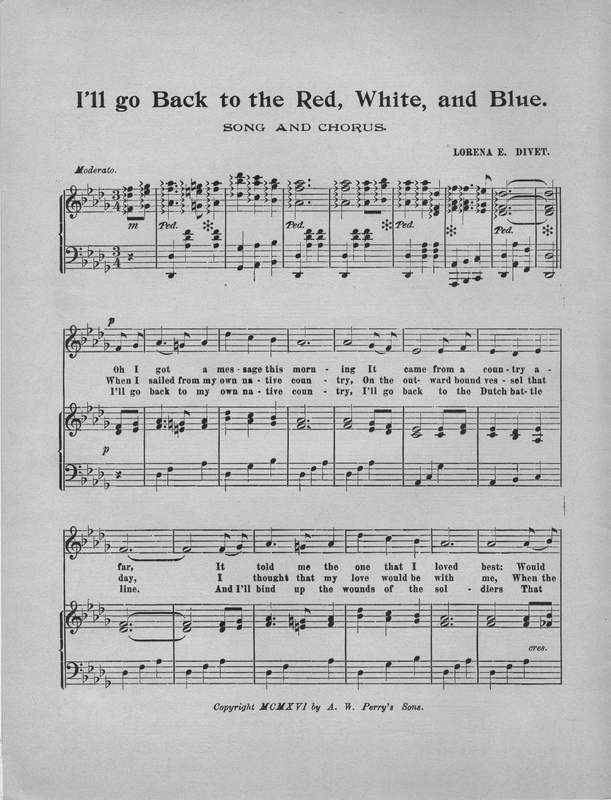
Title found in Gaylord Music Library Special Collections. Click the image for more details about this item; click here to download a pdf of the score.
Frisch auf! openly supported German interests, but Lorena E. Divet’s I’ll Go Back to the Red, White, and Blue (1916, also published in St. Louis) reveals a more conflicted German-American response to the war. Divet’s female narrator is a German immigrant; she refers to herself as “Dutch,” an Americanization of the German adjective “deutsch.” Her lover stayed behind “at the call of the Kaiser” and has died in the war. She vows to return to the battlefield in his memory as a nurse, but promises, “When my country shall need me no longer, I’ll go back to the Red, White, and Blue.” Her lover feels similarly torn between Germany and America; while vowing to remain true to his home country, he confesses, “I’m glad that my own little Dutch girl is safe 'neath the Red, White and Blue.” Nothing is known of Divet’s own biography, but her song, published in a city with an extensive German population, resounds with the complicated familial and cultural ties that bound German-Americans both to their old country and their new one.
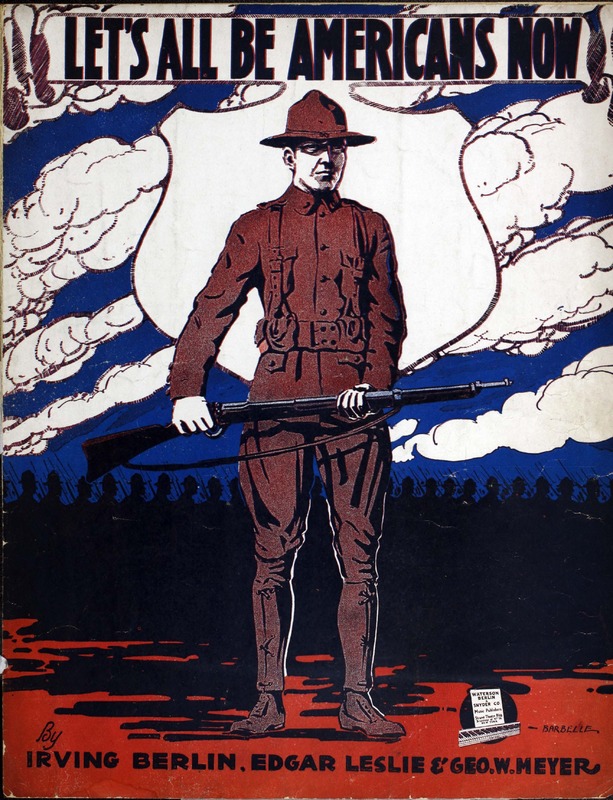
Title found in both The Louis and Jodi Atkin Family Collection and Gaylord Music Library Special Collections. Click the image for more details about this item; click here to download a pdf of the score.
If German Americans felt torn between two worlds, Irving Berlin (1888-1989), Edgar Leslie (1885-1976), and George W. Meyer (1884-1959) proposed a solution in Let’s All Be Americans Now (1917). Loyalty to the United States trumped any ties to the Old World, as suggested by the cover illustration’s close-up view of a stalwart American soldier. Supporting the United States’ official entrance into the war, the song’s chorus addresses America’s immigrant population:
England or France may have your sympathy,
Or Germany, but you'll agree,
That now is the time to fall in line,
You swore that you would, so be true to your vow:
Let's all be Americans now!
Of the three composer-lyricists, only Irving Berlin had firsthand knowledge of the immigrant experience. Meyer and Leslie were born in Boston, MA and Stamford, CT, respectively. Berlin was born in Russia and emigrated to the United States as a child.
Listen to Let's All Be Americans Now at the University of California, Santa Barbara Library here. This performance features singer Adolph J. Hahl, who later anglicized his name to Arthur Hall to avoid anti-German sentiment.
